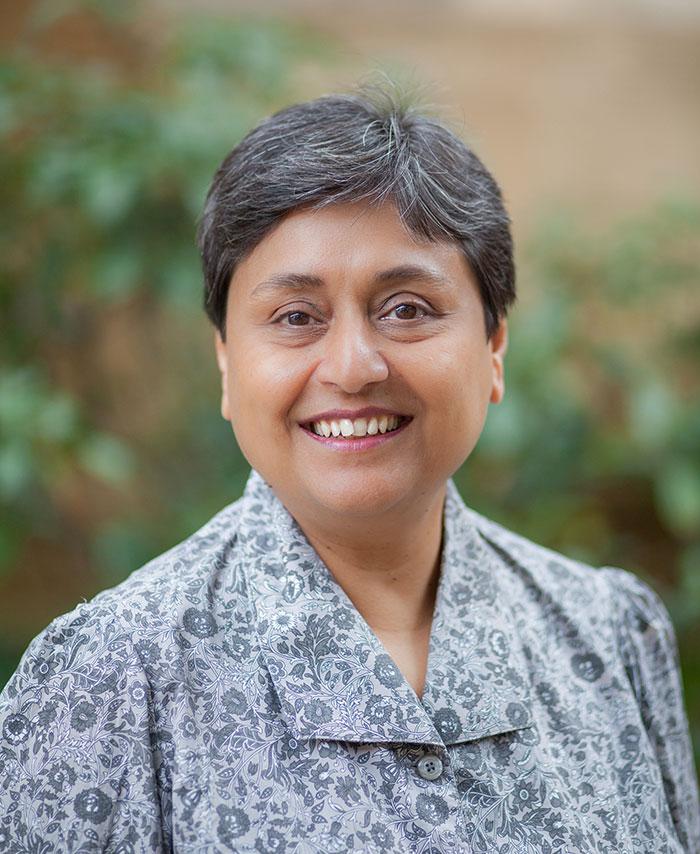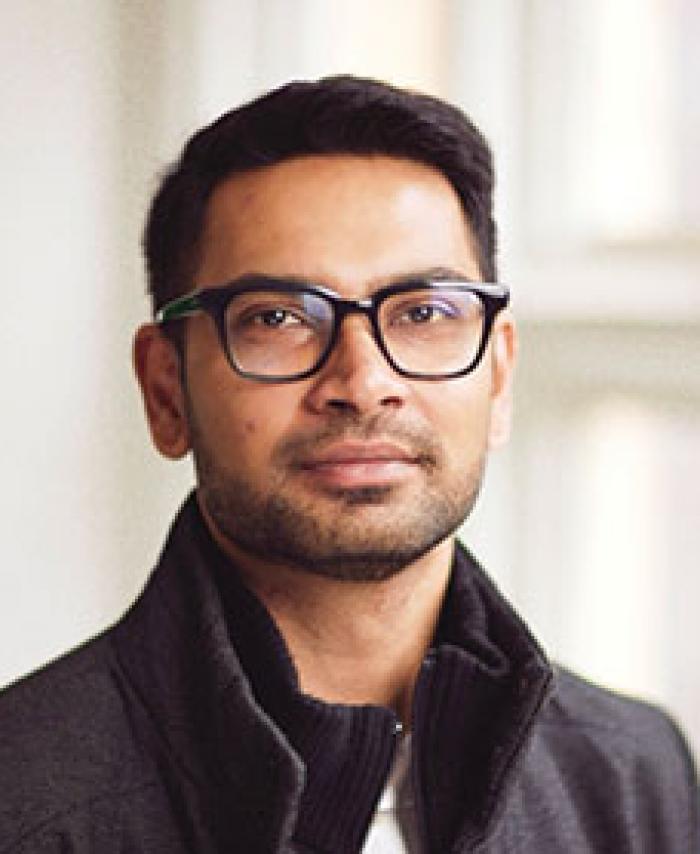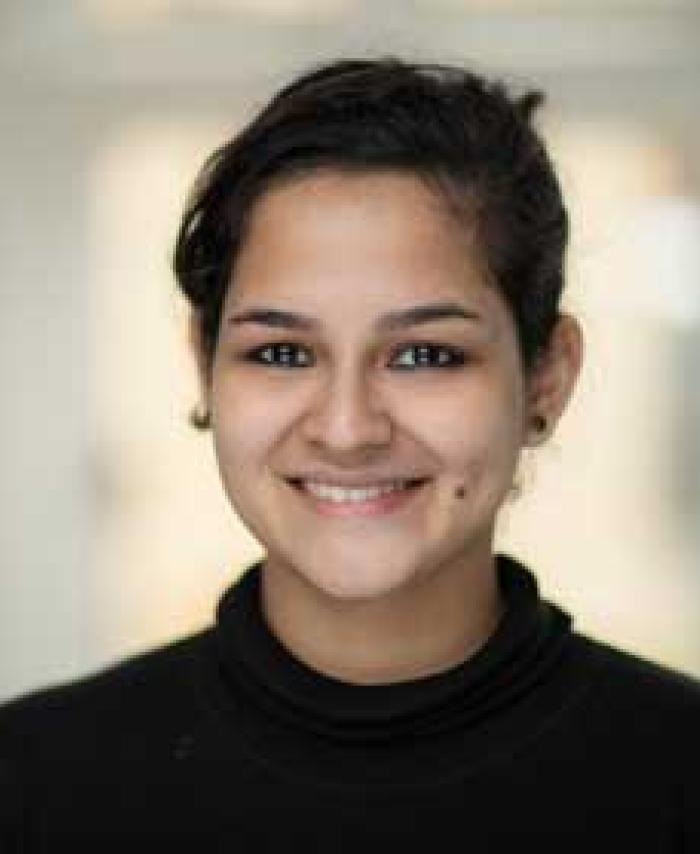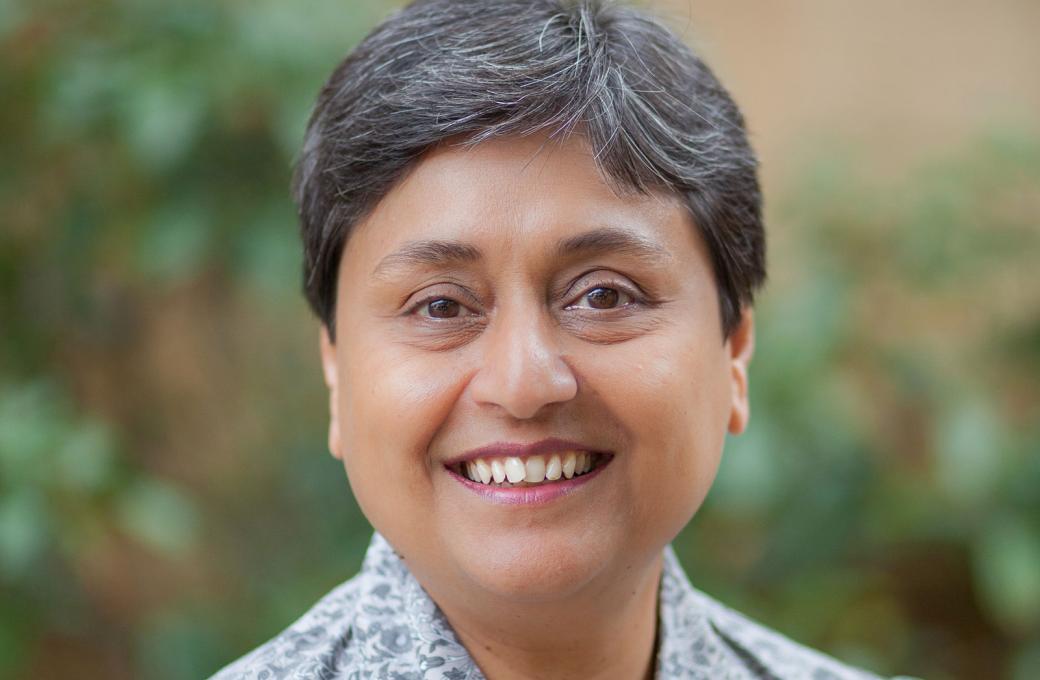
Research interests
South Asian studies, with a focus on India; globalisation, labour and changing cultures of work in India; youth, politics and poverty; urban gendered violence; contemporary India's enterprise culture and the complexities of the making of the 'enterprising self', covering workplace culture, the media, mental health and personality development, religion and spirituality, education and skill training; urban development and politics; urbanisation and social history of metropolitan and small-town India; the urban poor and politics; democracy, rights, political identity and social movements.
Nandini Gooptu
Nandini Gooptu is Associate Professor of South Asian Studies at the Oxford Department of International Development and Fellow of St Antony's College. She is currently Associate Head of the Social Sciences Division for Equality, Diversity and Inclusion. She was Head of Department between 2012 and 2016. She has been Senior Tutor, Sub Warden and Acting Warden at St Antony’s. Educated in Calcutta and at Cambridge, she previously held research fellowships and taught at St John’s College and Centre of South Asian Studies, Cambridge.
She is the author of The Politics of the Urban Poor in Early-Twentieth Century India(Cambridge University Press, 2001), editor of Enterprise Culture in Neoliberal India(Routledge, 2013), and joint-editor of India and the British Empire (Oxford University Press, Oxford History of the British Empire series, 2012) and Persistence of Poverty in India (Social Science Press, 2013 and Routledge, 2017).
Trained as a social historian, her past research was on urban politics and poverty in colonial India. Her recent research is multidisciplinary and concerned with social and political transformation and cultural change in contemporary India in the wake of economic liberalisation and globalisation. She is currently researching new cultures of work in India and leading the India leg of an ESRC-funded project on urban transformation and gendered violence in India and South Africa, in collaboration with the Universities of Cambridge (lead institution) and Johannesburg. She has researched and published on a variety of subjects, including caste and religious politics, urban change and politics, poverty and labour, enterprise culture, skill development, media and politics, and social movement of sex workers.
She is the chair of the international advisory board and editorial board of Oxford Development Studies. She is a member of the editorial boards of Springer’s “Exploring Urban change in South Asia” book series and Anthem’s “Modern South Asian History” series. She was the editor of the “Diversity and Plurality in South Asia” book series of Anthem Press.
For the MPhil in Development Studies, Nandini Gooptu lectures on the History and Politics foundation course, the Core Course and the Research Methods course. She offers a paper on the History and Politics of South Asia for the MPhils in Development Studies, Politics (Department of Politics and International Relations), and Modern South Asian Studies (Oxford Department of Global and Area Studies). She also teaches South Asian Politics for the undergraduate PPE degree course. She has previously been the Director of Graduate Studies in Development Studies, the Director of Doctoral Research in International Development and the Course Director and Chair of Examiners of the MPhil in Development Studies.
She has supervised over 40 doctoral students, including the current cohort, in the Departments of International Development, Politics, and Sociology, and in the Faculty of Modern History at Oxford. Her former students have gone on to take up academic appointments at major universities in the UK, India, USA and elsewhere.
She was the recipient of a University of Oxford Teaching Excellence Award, in 2008, for “Outstanding teaching and commitment to teaching”.
Research students supervised
-
Books and monographs( ) Persistence of Poverty in India . , Delhi: Social Science Press and London: Routledge( ) Enterprise Culture in Neoliberal India: Studies in Youth, Class, Work and Media . , London: Routledge( ) India and the British Empire . , Oxford: Oxford University Press( ) Swami Acchutanand and the Adi Hindu movement . [Originally published as Chapter 5 of The Politics of the Urban Poor in Early Twentieth Century India] , New Delhi: Critical Quest( ) The Politics of the Urban Poor in Early Twentieth-Century India . , Cambridge: Cambridge University Press
-
Journal articles and special issues( ) Skill, Work and Gendered Identity in Contemporary India: The Business of Delivering Home-Cooked Food for Domestic Consumption . Journal of South Asian Development 13 (3) 293-314( ) JSAD Special Issue on Skill Development in India . Journal of South Asian Development 13 (3) 241-48( ) Tension South Asia: Journal of South Asian Studies 40 (2) 404-06( ) New spirituality, politics of self-empowerment, citizenship and democracy in contemporary India . Modern Asian Studies 50 (3) 934-74( ) Servile Sentinels of the City: Private Security Guards, Organized Informality, and Labour in Interactive Services in Globalized India . International Review of Social History 58 (1) 9-38( ) Neoliberal Subjectivity, Enterprise Culture and New Workplaces: Organised Retail and Shopping Malls in India . Economic and Political Weekly 44 (22) 45-54; Reprinted in Pulapre Balakrishnan, Suhas Palshikar, and Nandini Sundar (eds), Reading India: Selections from Economic and Political Weekly, Volume III: 1991–2017 (2019)( ) Economic Liberalisation, Work and Democracy: Industrial Decline and the Urban Poor in Kolkata . Economic and Political Weekly 42(21) 1922-33( ) 'Rights to Stop the Wrong': Cultural Change and Collective Mobilisation - The Case of Kolkata Sex Workers . Oxford Development Studies 35(3) 251-72( ) The Urban Poor and Militant Hinduism in Early Twentieth-century Uttar Pradesh . Modern Asian Studies 31(4) 879-918( ) Urban Poverty and the Politics of Caste and Religion in Early Twentieth Century North India: Implications for Development Practice and Research . Oxford Development Studies 24(3) 221-40( ) The 'Problem' of the Urban Poor: Policy and Discourse of Local Administration: A Study in Uttar Pradesh in the Interwar Period . Economic and Political Weekly 31(50) 3245-54
-
Chapters( ) Religious myths retold: Masters and servants in India's corporate culture . In Daromir Rudnyckyj, Filippo Osella Religion and the morality of the market , Cambridge: Cambridge University Press( ) Divided We Stand: The Indian City after Economic Liberalisation . In Knut A Jacobsen Routledge Handbook of Contemporary India , London: Routledge( ) The Construction of Poverty and the Poor in Colonial and Post-colonial India: An Overview . In Nandini Gooptu, Jonathan Parry Persistence of Poverty in India , Delhi: Social Science Press; Reprinted in Subas Mohapatra (ed) Society and Culture in India: A Reader (Delhi: Social Science Press, 2017)( ) New Spiritualism and the Micro-politics of Self-making in India's Enterprise Culture . In N Gooptu Enterprise Culture in Neoliberal India: Studies in Youth, Class, Work and Media , London: Routledge( ) Reality TV in India and the Making of an Enterprising Housewife . In N Gooptu Enterprise Culture in Neoliberal India: Studies in Youth, Class, Work and Media , London: Routledge( ) Understanding the Political Legacy of Colonialism . In D Peers, N Gooptu India and the British Empire , Oxford: Oxford University Press( ) Economic Liberalization, Urban Politics and the Poor . In S Ruparelia, S Reddy, J Harriss, S Corbridge Understanding India's New Political Economy: A Great Transformation? , London, New York: Routledge pp 35-48( ) Sex Workers in Calcutta and the Dynamics of Collective Action: Political Activism, Community Identity and Group Behaviour . In J Heyer, F Stewart, R Thorp Group Behaviour and Development: Is the Market Destroying Cooperation? , Oxford: Oxford University Press pp 227-51( ) Imagi-Nation: The Media, Nation and Politics in Contemporary India . In B Street, E Hallam Cultural Encounters: Communicating Otherness , London: Routledge pp 89-107( ) Mapping India's World of Unorganised Labour . In L Panitch, C Leys Working Classes, Global Realities: Socialist Register 2001 , London: Merlin Press pp 89-118( ) Caste and Labour: Untouchable Social Movements in Urban Uttar Pradesh in the Early Twentieth Century . In Peter Robb Dalit Movements and Meanings of Labour in India , New Delhi: Oxford University Press; Reprinted in Sumit Sarkar and Tanika Sarkar (eds) Caste in Modern India: A Reader – Volume 2 (New Delhi: Permanent Black, 2014) 227-98
-
Working papers( ) Sex Workers in Calcutta and the Dynamics of Collective Action: Political Activism, Community Identity and Group Behaviour . WIDER Working Papers , Helsinki: WIDER United Nations University 185 (May)






